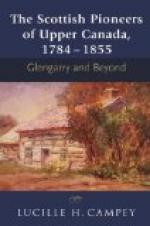Nobody, however, had been killed, though much of the luggage was lost, and what remained had to be spread out to dry. Many of Mackenzie’s people, however, when they took stock of their misfortunes, were rather pleased than otherwise, as they thought the disaster would stop him from any further attempt to reach the Western Sea. He wisely listened to their observations without replying, till their panic was dispelled, and they had got themselves warm and comfortable with a hearty meal and a glass of rum; though a little later only by their indifferent carelessness they nearly exploded the whole of the expedition’s stock of gunpowder.
Fortunately the weather was fine. Mackenzie and his fellow countryman, Mackay, allowed nothing to dismay them or damp their spirits. Bark was obtained from the forest, the canoe was repaired, and they heard from their guide that this violent little stream would before long join a great and much smoother river. But they were tormented with sandflies and mosquitoes, and a day or two afterwards the guide bolted, while the expedition had to cross morasses in which they were nearly engulfed, and the water journey was constantly obstructed by driftwood. Nevertheless, at last they had “the inexpressible satisfaction of finding themselves on the bank of a navigable river on the western side of the first great range of mountains”. Here they re-embarked, and were cheerful in spite of heavy rain.
As they paddled down this great stream, more than two hundred yards wide, snow-capped mountains rose immediately above the river. The current was strong, but perfectly safe. Flocks of ducks, entirely white, except the bill and a part of the wing, rose before them. Smoke ascending in columns from many parts of the woods showed that the country was well inhabited, and the air was fragrant with the strong odour of the gum of cypress and spruce fir.
Then came a series of cascades and falls and a most arduous portage of the heavy canoe. These labours were somewhat lightened by the discovery of quantities of wild onions growing on the banks; but these, when mixed with the pemmican, on which the party was subsisting, stimulated their appetites to an inconvenient degree, seeing that they were on short commons. Meeting with strange Indians they found no one to interpret, and had to use signs. But on the banks of the Fraser they were lucky enough to find the “real red deer”, the great wapiti stag, which is absent from the far north-west, beyond the region of the Saskatchewan. The canoe was loaded with venison. The banks of the Fraser River sank to a moderate height and were covered with poplars and cypresses, birch trees, junipers, alders, and willows. The deserted house or lodge of some Amerindian tribe was visited on the banks. It was a finer structure than anything that Mackenzie had seen since he left Fort Michili-Makinak in upper Canada. It had been constructed for three families. There were three fireplaces and three beds and a kind of larder for the purpose of keeping fish. The whole “lodge” was twenty feet long by three wide, and had three doors. The walls were formed of straight spruce timbers with some skill of carpentry. The roof was covered with bark, and large rods were fixed across the upper part of the building, where fish might hang and dry.




